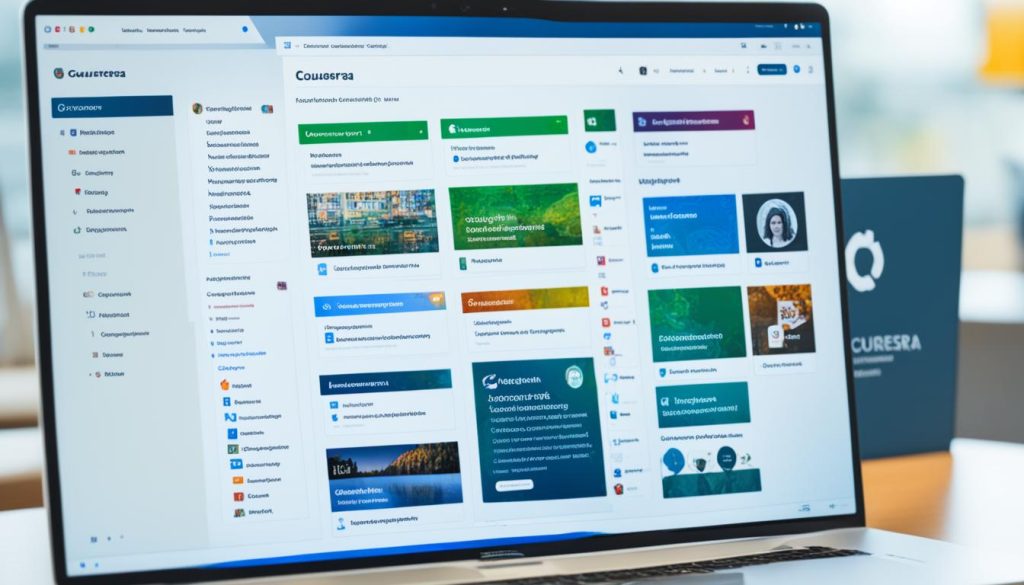Unleash your knowledge by Harnessing the power of online education platforms
Online education has completely transformed the way we learn, opening up a world of possibilities and opportunities. With the rise of virtual learning programs, distance education courses, and online degree programs, individuals now have the flexibility and convenience to expand their knowledge and skills from the comfort of their own homes. Internet-based education has revolutionized the traditional learning model, making education accessible to a wider audience and breaking down barriers to learning.
Digital learning platforms have played a significant role in this revolution, providing a seamless and user-friendly experience for learners. These platforms offer diverse courses and learning materials, catering to various interests and disciplines. Whether you’re looking to gain new skills for personal growth or seeking professional development, online education platforms have you covered.
Key Takeaways
- Online education provides flexibility and convenience for learners.
- Virtual learning programs offer a wide range of courses and resources.
- Internet-based education has made learning more accessible and inclusive.
- Digital learning platforms enhance the learning experience through user-friendly interfaces and collaboration features.
- Distance education courses and online degree programs enable individuals to elevate their education and transform their future.
The Importance of Continuous Learning in Today’s World
In today’s fast-paced and ever-evolving world, continuous learning has become more crucial than ever. It serves as a driving force for personal and professional growth, enabling individuals to expand their horizons, enhance their skills, and stay relevant in their respective fields. By embracing continuous learning, individuals can adapt to change, develop a growth mindset, and unlock their full potential.
Continuous learning fosters personal growth by challenging individuals to think critically, explore new ideas, and gain a deeper understanding of the world around them. It encourages curiosity, creativity, and lifelong curiosity, empowering individuals to pursue their passions and discover new interests. Moreover, continuous learning enables individuals to cultivate adaptability, resilience, and flexibility in the face of uncertainties and changing circumstances.
From a professional standpoint, continuous learning is essential for career advancement and staying competitive in today’s dynamic job market. It allows individuals to upskill themselves, acquire new knowledge and competencies, and align with the demands of evolving industries. By continuously updating their skills, professionals can stand out in their fields, seize emerging opportunities, and thrive in a rapidly changing work environment.
“The more that you read, the more things you will know. The more that you learn, the more places you’ll go.” – Dr. Seuss
Continuous learning can take various forms, including formal education, online courses, workshops, seminars, and self-directed study. It is a lifelong journey that requires dedication, curiosity, and a growth mindset. By embracing continuous learning, individuals can nurture their potential, achieve personal fulfillment, and contribute meaningfully to their communities.
The Benefits of Continuous Learning:
- Facilitates personal growth and development
- Enhances critical thinking and problem-solving skills
- Promotes adaptability and resilience
- Enables professional advancement and career growth
- Keeps individuals updated with current trends and technologies
- Expands individuals’ networks and opportunities for collaboration
Continuous learning is a lifelong commitment to personal and professional growth. It is an investment in oneself, opening doors to new possibilities, and creating a pathway to success. Embracing continuous learning is not only beneficial for individuals but also for society as a whole, as it fosters innovation, progress, and a culture of continuous improvement.
Traditional vs. Online Learning: Pros and Cons
Education plays a fundamental role in personal growth and skill development. However, the traditional classroom setting is not the only avenue for learning anymore. With the rise of online education, learners now have access to a wide range of courses and resources from the comfort of their own homes. Let’s explore the pros and cons of both traditional and online learning.
Traditional Learning
In traditional learning, students attend physical classrooms and engage in face-to-face communication with their teachers and peers. This structured environment allows for immediate feedback and promotes a deeper understanding of the subject matter. Students can ask questions, participate in discussions, and benefit from the guidance of experts in their field.
However, traditional learning also comes with its limitations. It often requires fixed schedules and geographical proximity, making it less flexible for individuals with busy lifestyles or those residing in remote areas. Additionally, the traditional classroom setting may not cater to diverse learning styles and preferences.
Online Learning
Online learning provides unparalleled flexibility and convenience. Learners can access course materials, lectures, and assignments at their own pace and on their own schedule. This flexibility eliminates the need for fixed class times, allowing individuals to balance their education with other commitments. Online learning also breaks down geographical barriers, enabling people from all corners of the world to participate in diverse courses and programs.
However, online learning may lack the same level of social interaction and engagement as traditional learning. The absence of face-to-face communication can hinder immediate feedback and collaborative learning experiences. It requires self-motivation, discipline, and effective time management skills to succeed in an online learning environment.
Ultimately, the choice between traditional and online learning depends on individual preferences, learning styles, and lifestyle commitments. Some learners thrive in a structured classroom setting, while others prefer the flexibility and convenience of online education. The key is to find a learning method that aligns with your goals and allows you to maximize your potential.
| Traditional Learning | Online Learning | |
|---|---|---|
| Environment | Structured classrooms | Virtual classrooms |
| Communication | Face-to-face with teachers and peers | Virtual communication |
| Flexibility | Fixed schedules | Self-paced learning |
| Convenience | Geographical limitations | Accessible from anywhere |
| Interaction | Direct feedback and collaborative learning | Less immediate feedback and limited social interaction |
Whichever path you choose, remember that education is a lifelong journey. Embrace the opportunities offered by both traditional and online learning to continuously expand your knowledge and skills.
Top Online Learning Platforms: A Comparison
With the rise of online education, there is an abundance of learning platforms available today, each offering unique features and benefits to cater to different needs. In this section, we will compare some of the top platforms in the market and explore their key offerings.
Coursera: A Wide Range of Academic and Professional Courses
Coursera is a leading online learning platform that partners with prestigious universities and institutions to offer a vast array of academic and professional courses. Whether you’re looking to enhance your skills in computer science, business, data science, or any other discipline, Coursera provides a diverse range of courses taught by world-class instructors. The platform offers flexible learning options, allowing you to learn at your own pace or follow a structured course with specific start and end dates.
Udemy: Extensive Catalog Taught by Industry Experts
Udemy is renowned for its extensive catalog of courses taught by industry experts. Whether you want to develop new coding skills, improve your photography techniques, or learn about marketing strategies, Udemy offers a wide range of courses in various fields. You can choose from both free and paid courses, providing flexibility and accessibility to learners of all levels and budgets.
LinkedIn Learning: Professional Development in Business, Technology, and Creative Skills
LinkedIn Learning focuses on professional development and offers an extensive collection of courses in business, technology, and creative skills. The platform provides users with the opportunity to learn from industry professionals and acquire the skills necessary to excel in their careers. Whether you’re looking to enhance your leadership abilities, learn coding languages, or improve your graphic design skills, LinkedIn Learning has a course for you.
Khan Academy: Free, High-Quality Education for K-12 Students
Khan Academy is dedicated to providing free, high-quality education to K-12 students. Their mission is to offer a personalized learning experience for students around the world. With a wide range of subjects, including mathematics, science, humanities, and test preparation, Khan Academy offers educational resources to help students succeed academically.
Skillshare: Creative Skills with a Subscription-Based Model
Skillshare is a platform that focuses on creative skills and offers a subscription-based model for unlimited access to their library of courses. Whether you want to explore your artistic side, learn about video editing, or develop your writing skills, Skillshare provides a vast range of courses taught by experienced professionals. The platform encourages collaboration and community, allowing learners to engage with each other and share their projects.
Each platform mentioned above offers its own unique value proposition, allowing learners to find the best fit for their educational needs and preferences. Take your time to explore these platforms to expand your knowledge and skills in the comfort of your own home.

Coursera: A Comprehensive Platform for Academic and Professional Courses
Coursera is a leading online learning platform that offers a diverse range of academic and professional courses. With its partnership with prestigious universities and institutions, Coursera provides learners with access to high-quality education and opportunities to enhance their skills and knowledge.
One of the key advantages of Coursera is its extensive catalog of courses in various subjects. Whether individuals are interested in pursuing academic disciplines or seeking professional development, Coursera offers a wide array of options to cater to their specific interests and goals.
Coursera’s platform is designed to provide flexible learning options to accommodate different learning styles and schedules. The platform offers self-paced courses, allowing learners to study at their own pace and convenience. It also offers structured courses with specific start and end dates for learners who prefer a more guided and time-bound learning experience.
With a user-friendly interface and collaboration features, Coursera enhances the learning experience for learners. The platform facilitates interaction with instructors and fellow learners, creating a supportive and engaging online learning community.
Whether individuals are looking to advance their careers, acquire new skills, or explore new areas of knowledge, Coursera offers a comprehensive learning platform that empowers learners to achieve their goals.

Conclusion
Online education has revolutionized the way we learn, providing unparalleled accessibility, flexibility, and a wide range of courses. With just a click, individuals can access diverse, high-quality courses tailored to their interests and career goals. This accessibility enables learners to take control of their education and unlock their full potential.
One of the significant advantages of online education is its flexibility. Learners can study at their own pace, making it suitable for working professionals, stay-at-home parents, and individuals with busy schedules. This flexibility allows for a personalized and individualized learning experience, maximizing skill development and knowledge acquisition. Additionally, online education offers a cost-effective learning option, eliminating the need for expensive textbooks, commuting costs, and accommodation expenses often associated with traditional education.
Moreover, online education contributes to environmental sustainability by reducing the carbon footprint associated with traditional education. By eliminating the need for commuting and physical resources, individuals can pursue their educational goals while promoting a greener future. However, challenges such as the digital divide and the need for self-motivation should not be overlooked. Ensuring equitable access to technology and fostering self-discipline are crucial in overcoming these challenges.
As technology continues to advance, the future of online learning holds even more potential for transforming education. With the development of virtual reality, artificial intelligence, and interactive learning platforms, online education can provide immersive and engaging learning experiences. These advancements will further bridge the gap between online and traditional education, offering learners the best of both worlds.
FAQ
What is online education?
Online education refers to the use of digital platforms and technology to provide virtual learning programs, distance education courses, and online degree programs. It allows individuals to acquire knowledge and skills through internet-based education.
How does online education benefit learners?
Online education offers flexibility and convenience, allowing learners to access course materials and lectures at their own pace and convenience. It provides a wide range of courses and personalized learning experiences. Online education also contributes to cost-effectiveness and environmental sustainability in education.
What are the challenges of online education?
Some challenges of online education include the digital divide, which may limit access to technology and internet connectivity. Online learning also requires self-motivation and discipline to stay engaged and complete coursework. However, advancements in technology continue to address and overcome these challenges.
Is online education as effective as traditional learning?
Online education offers flexibility and convenience, but it may lack the same level of social interaction and immediate feedback as traditional learning conducted in physical classrooms. However, online education has proven to be just as effective in imparting knowledge and skills, with the added benefits of accessibility and personalized learning experiences.
Are there reputable online learning platforms available?
Yes, there are several reputable online learning platforms available. Some top platforms include Coursera, which offers a wide range of academic and professional courses in partnership with prestigious universities. Udemy provides courses taught by industry experts, and LinkedIn Learning focuses on professional development. Khan Academy offers free education targeting K-12 students, and Skillshare focuses on creative skills.
Can you tell me more about Coursera?
Coursera is a comprehensive online learning platform that partners with prestigious universities and institutions to offer a wide range of academic and professional courses. It provides flexible learning options, including self-paced courses and structured courses with specific start and end dates. Coursera’s user-friendly interface and collaboration features enhance the learning experience for learners.
